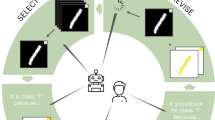Abstract
Developing accountable models with limited data is a pivotal challenge in machine learning. Common strategies include utilizing large supporting datasets via transfer learning or incorporating domain knowledge. However, domain knowledge is typically added in pre-processing and post-processing stages, insufficient for effective training. Frameworks like active learning offer iterative mechanisms for expert input, but ignore experts’ sophistication and limitations. This paper proposes a framework where expert knowledge input is central, enabling iterative teaching by both data and experts. Experts provide critical knowledge, avoiding overwhelm by extensive training epochs. Precise model explanation definitions and quantifiable expert knowledge distinctions are required. By integrating both strategies, bias and scarcity are addressed, empowering experts to monitor, understand, and influence learning. Comparisons with similar frameworks and experimental results demonstrate improved performance with less data, facilitating collaboration between machine learning and industries.
Access this chapter
Tax calculation will be finalised at checkout
Purchases are for personal use only
Similar content being viewed by others
Notes
- 1.
It is assumed the data is balanced between both classes.
References
Akturk, M.: Diabetes dataset. Website (1999). https://www.kaggle.com/mathchi/diabetes-data-set
Aljanaki, A., Yang, Y.H., Soleymani, M.: Emotion in music task at mediaeval 2015. In: In Working Notes Proceedings of the MediaEval 2015 Workshop (2015)
Amershi, S., Cakmak, M., Knox, W.B., Kulesza, T.: Power to the people: the role of humans in interactive machine learning. AI Mag. 35(4), 105–120 (2014)
Janosi, A., Steinbrunn, W., Pfisterer, M., Detrano, R.: Heart disease UCI. Website (1988). https://archive.ics.uci.edu/ml/datasets/Heart+Disease
Cook, L., Friend, M.: Co-teaching: guidelines for creating effective practices. Focus on Exceptional Children 28 (1995)
Dai, W.Z., Xu, Q., Yu, Y., Zhou, Z.H.: Bridging machine learning and logical reasoning by abductive learning. In: NeurIPS 32 (2019)
Fedesoriano: stroke prediction dataset. Website (1999). https://www.kaggle.com/datasets/fedesoriano/stroke-prediction-dataset
Hinton, G., Vinyals, O., Dean, J.: Distilling the knowledge in a neural network. arXiv preprint arXiv:1503.02531 (2015)
Kingma, D.P., Ba, J.: Adam: a method for stochastic optimization. arXiv preprint arXiv:1412.6980 (2014)
Koller, D., et al.: Introduction to statistical relational learning. MIT Press (2007)
Kosmyna, N., Tarpin-Bernard, F., Rivet, B.: Adding human learning in brain-computer interfaces (BCIs) towards a practical control modality. ACM Trans. Comput.-Hum. Interact. (TOCHI) 22(3), 1–37 (2015)
Kosmyna, N., Tarpin-Bernard, F., Rivet, B.: Conceptual priming for in-game BCI training. ACM Trans. Comput.-Hum. Interact. (TOCHI) 22(5), 1–25 (2015)
Lartillot, O., Toiviainen, P.: A Matlab toolbox for musical feature extraction from audio. In: DAFx, vol. 237, p. 244. Bordeaux (2007)
Li, J., Socher, R., Hoi, S.C.: DivideMix: learning with noisy labels as semi-supervised learning. arXiv preprint arXiv:2002.07394 (2020)
Li, L., Fan, Y., Tse, M., Lin, K.Y.: A review of applications in federated learning. Comput. Ind. Eng. 149, 106854 (2020)
Lopez-Paz, D., Bottou, L., Schölkopf, B., Vapnik, V.: Unifying distillation and privileged information. arXiv preprint arXiv:1511.03643 (2015)
Mohseni, S., Zarei, N., Ragan, E.D.: A multidisciplinary survey and framework for design and evaluation of explainable AI systems. ACM Trans. Interact. Intell. Syst. (TiiS) 11(3–4), 1–45 (2021)
Ribeiro, M.T., Singh, S., Guestrin, C.: Why should i trust you? Explaining the predictions of any classifier. In: Proceedings of the 22nd ACM SIGKDD International Conference on Knowledge Discovery and Data Mining, pp. 1135–1144 (2016)
Santoro, A., et al.: A simple neural network module for relational reasoning. In: Advances in Neural Information Processing Systems, vol. 30 (2017)
Settles, B.: Active learning literature survey (2009)
Sinha, S., Ebrahimi, S., Darrell, T.: Variational adversarial active learning. In: Proceedings of the IEEE/CVF International Conference on Computer Vision, pp. 5972–5981 (2019)
Snell, J., Swersky, K., Zemel, R.S.: Prototypical networks for few-shot learning. arXiv preprint arXiv:1703.05175 (2017)
Solso, R.L., MacLin, M.K., MacLin, O.H.: Cognitive psychology. Pearson Education New Zealand (2005)
Teso, S., Kersting, K.: Explanatory interactive machine learning. In: Proceedings of the 2019 AAAI/ACM Conference on AI, Ethics, and Society, pp. 239–245 (2019)
Vapnik, V., Vashist, A.: A new learning paradigm: learning using privileged information. Neural Netw. 22(5–6), 544–557 (2009)
Wang, W., Zhou, Z.H.: A new analysis of co-training. In: ICML, vol. 2, p. 3 (2010)
Zhao, A., et al.: Domain-adaptive few-shot learning. In: Proceedings of the IEEE/CVF Winter Conference on Applications of Computer Vision, pp. 1390–1399 (2021)
Author information
Authors and Affiliations
Corresponding author
Editor information
Editors and Affiliations
Rights and permissions
Copyright information
© 2025 The Author(s), under exclusive license to Springer Nature Singapore Pte Ltd.
About this paper
Cite this paper
Zhang, S., Zhou, F., Li, Z., Wang, Y., Qi, D., Li, S. (2025). Expert-Guided Model Cultivation: CoTeaching to Resolve Abstruseness and Enhance Learning Performance. In: Sheng, Q.Z., et al. Advanced Data Mining and Applications. ADMA 2024. Lecture Notes in Computer Science(), vol 15388. Springer, Singapore. https://doi.org/10.1007/978-981-96-0814-0_2
Download citation
DOI: https://doi.org/10.1007/978-981-96-0814-0_2
Published:
Publisher Name: Springer, Singapore
Print ISBN: 978-981-96-0813-3
Online ISBN: 978-981-96-0814-0
eBook Packages: Computer ScienceComputer Science (R0)




